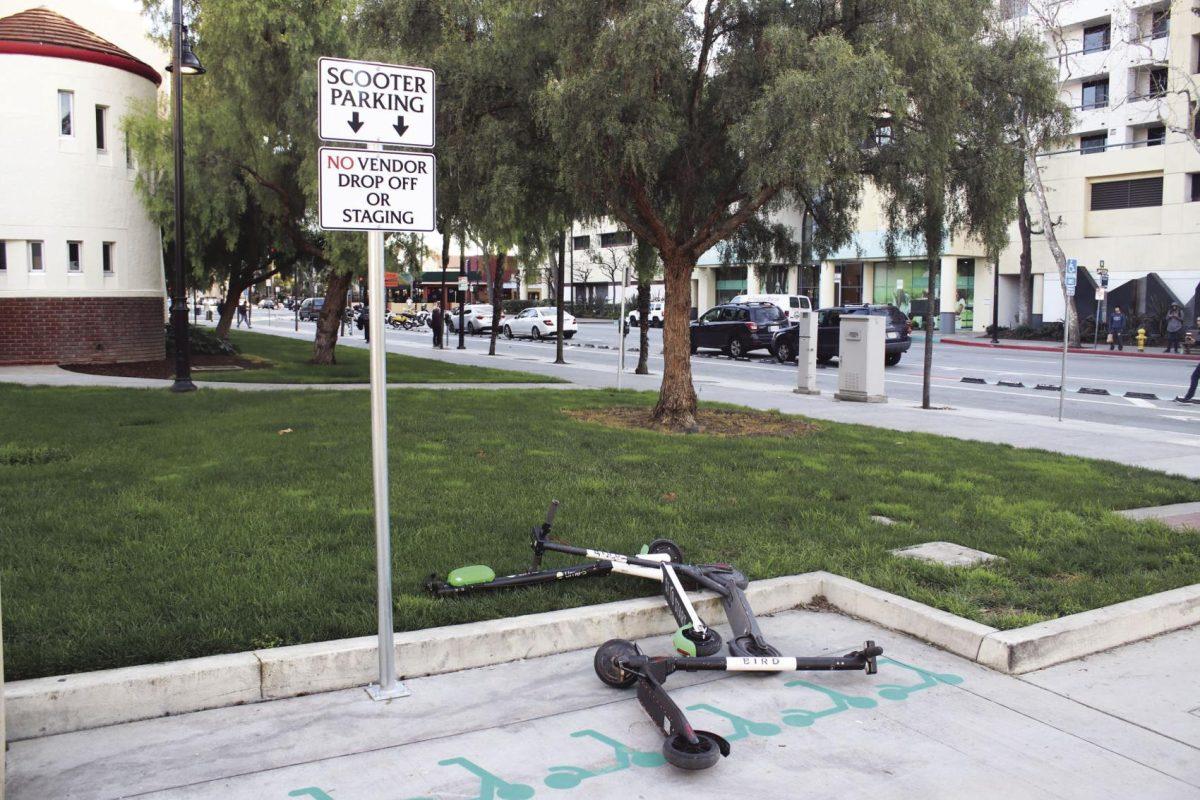
In an effort to reduce the clutter of scooters, San Jose State installed two motorized scooter parking lots. One lot was placed near Dudley Moorhead Hall and the other on South 4th Street behind Washington Square Hall.
The spots were also a response to new mandates placed by the city of San Jose on motorized scooter-sharing companies.
Though not every city with scooter-sharing devices faces the same circumstances as San Jose, Mayor Sam Liccardo took a unique approach in dealing with scooter laws.
Liccardo and Mayor Ted Winterer of Santa Monica sent a joint letter to Travis VanderZanden, the CEO of Bird Scooters, requesting that the company implement safety precautions for its devices.
“As progressive, innovation-friendly mayors, we do not like to pit all-or-nothing regulatory policies against innovative technologies,” they stated. “So we encourage you to join us in seeking another path – one that will better protect the safety of our residents and help your company avoid the existential risk of bans.”
The “all-or-nothing” policy Liccardo and Winterer referred to was implemented on campuses like Cleveland State University.
Following the death of a 21-year-old woman in Cleveland, the university banned motorized scooters and their respective scooter-sharing companies on its campus.
Students at SJSU noticed the lack of local safety precautions taken by scooter-sharing companies.
“I never see anyone wearing a helmet,” said undeclared freshman Christian Drake.
SJSU students have also taken notice of the sheer number of these motorized scooters around campus.
“They’re everywhere,” said business freshman Ashur Wong. “They’re on the ground and in a variety of places.”
Liccardo, along with City Council members Raul Peralez and Devora Davis, issued safety guidelines for companies to follow in an effort to reduce the problems noticed by SJSU students and San Jose residents alike.
Geofencing is referenced in the guidelines, which is GPS tracking to enforce a maximum speed on the scooters depending on its location.
San Jose representatives would also like companies to share user data with the city in order to understand frequent routes and build infrastructure around that.
The infrastructure the city is hoping to build for these scooters includes suitable bike lanes in all commonly used streets and more designated parking lots for the scooters.
These guidelines are more liberal compared to the route other cities have taken when dealing with the motorized scooter epidemic.
The city of Phoenix for example, banned scooter-sharing companies and their devices from the entire city.
So far, the new parking lots at SJSU have not been put to use the way the school intended. Many students on campus are unaware that the lots even exist.
“They put up parking lots for them?” asked kinesiology freshman Kasey Javier. “I had no idea, where are they?”
Scooter-sharing companies such as Lime and Bird are not only behind on establishing dedicated scooter parking lots, but they also have yet to begin implementing geofencing within their devices.
According to Drake, a frequent user of Bird scooters, the company has so far only reduced the maximum speed on the devices.
“Yeah I used to be able to hit 20 [miles per hour] on those things,” he said. “They slowed them down yeah. They’re still fast, though.”
It is unclear at this time whether more safety measures will be applied. The city of San Jose has yet to respond to the lack of execution on the scooter-sharing company’s part.